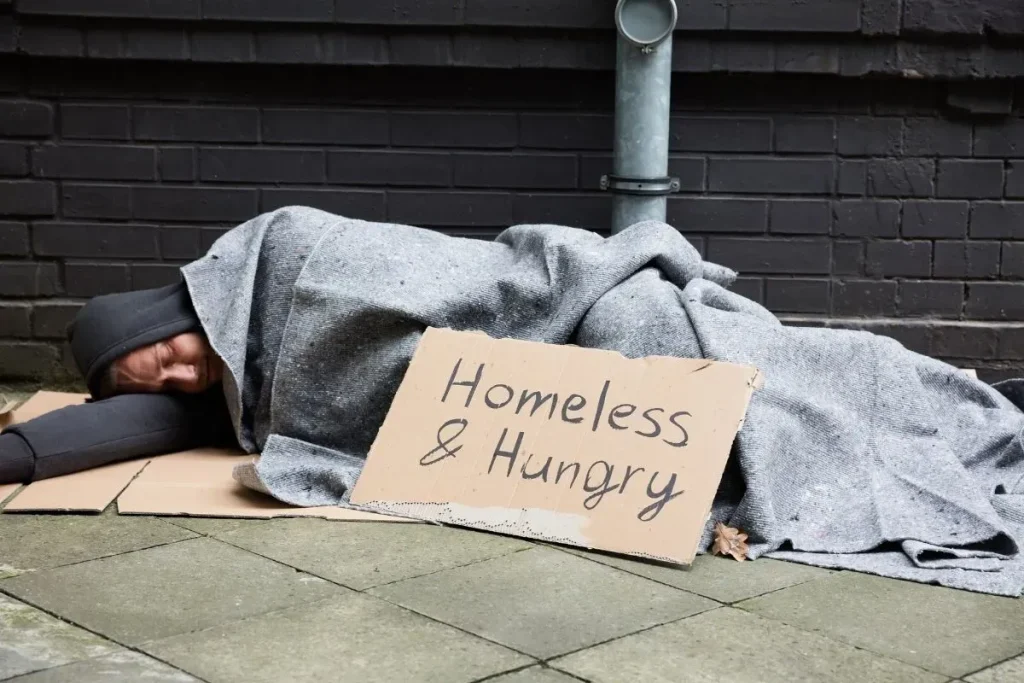Homelessness is a persistent issue that deeply affects communities across the globe, sparking debates on how to provide effective solutions. In cities like Medicine Hat, Alberta, even when free or low-cost housing is available, many individuals experiencing homelessness choose to remain on the streets, revealing the complex interplay of mental health and addiction in their lives. This reluctance underscores the importance of a comprehensive approach to homeless advocacy, where services cater not only to shelter but also to the root causes of addiction and mental health homelessness. Understanding the factors that drive these individuals away from housing initiatives is critical for community outreach for the homeless. As we explore these challenges, it becomes clear that the ‘housing first’ approach must be complemented by supportive services to truly make a difference in the lives of those affected by homelessness.
The plight of those living without permanent residence highlights a broader social dilemma that many urban areas face. Individuals without homes often experience a unique set of challenges that include addiction issues and mental health complications, which can lead to their hesitance to accept conventional living arrangements. Many who are unhoused may feel a stronger sense of belonging within the very communities they have created on the streets, making it difficult for outreach programs to entice them with housing offers alone. Addressing homelessness requires innovative support systems that recognize the varied needs of these individuals, from psychological assistance to substance recovery programs. As cities grapple with how to foster inclusivity and stability, understanding the many facets of homelessness becomes more essential than ever.
Understanding the Complexity of Homelessness
Homelessness is not just about lacking a physical shelter; it encompasses a complex interplay of personal choice, societal structures, and mental health. Many individuals living on the streets of Medicine Hat, for instance, reject the prospect of housing due to the intrinsic ties they have formed within their communities. For some, the streets serve as a space of autonomy where they can maintain their identities without the constraints imposed by traditional housing arrangements. This indicates that to address homelessness effectively, stakeholders must understand the psychological and social factors at play beyond merely providing shelter.
Moreover, mental health plays a crucial role in the lives of those experiencing homelessness. A significant portion of the homeless population battles various mental health challenges, which can make the idea of stability through housing feel daunting or unattainable. It raises an important dialogue about how city authorities and social services can produce a more resilient approach, one that merges homelessness advocacy with broad mental health resources. Tackling issues such as anxiety, depression, and trauma related to homelessness must go hand in hand with housing solutions to create a more inclusive society.
The Role of Addiction in Homelessness
Addiction is often cited as a significant barrier to housing for those experiencing homelessness. Many individuals struggling with substance use disorders perceive housing as a rigid structure that will impose additional restrictions on their perceived freedom. This sense of independence can often be conflated with their lifestyle choices, creating resistance to accepting help, even when it is offered at no cost. Addressing the relationship between addiction and homelessness involves understanding that recovery requires a non-judgmental environment where individuals feel empowered to make choices without pressure.
Furthermore, effective interventions must consider the unique needs of those battling both addiction and homelessness. Implementing a housing-first approach, which prioritizes stable housing as a pathway to recovery, can help shift these narratives. Programs that integrate addiction treatment with housing support have shown promise. By addressing dependencies while providing a stable home-base, community outreach for homeless individuals can become more effective in fostering lasting recovery and eventual reintegration into society.
Housing First: A Pathway or a Barrier?
The housing first approach has been a focal point in addressing homelessness, emphasizing the necessity of providing stable housing before tackling other challenges like mental health and substance abuse. This strategy can lead to remarkable success rates in decreasing homelessness, yet it can also reveal limitations. In regions such as Medicine Hat, some homeless individuals view immediate housing offers with skepticism, seeing them as a misunderstanding of their true needs or as an impersonal solution to a deeply personal struggle.
For the housing-first model to work fantastically, it must be coupled with supportive services that resonate with the individual’s realities. A one-size-fits-all strategy is rarely effective. Thus, it is essential for advocacy groups to tailor their approaches to fit the diverse stories of homelessness they encounter, including incorporating mental health services and addiction support into their outreach efforts. By deepening their understanding and responding with compassion and expertise, communities can create pathways that empower homeless individuals rather than alienating them.
Community Outreach and Its Effectiveness
Community outreach for the homeless has become an integral component of addressing the complexities of homelessness. It is not merely about extending offers of housing but entails building trust and understanding the myriad reasons behind someone’s reluctance to accept help. Outreach programs are designed to engage in meaningful dialogue with individuals on the streets, providing opportunities for them to express their needs, desires, and any apprehensions they may have regarding traditional housing.
These outreach efforts also serve to educate the broader community about the realities of homelessness, dismantling the stigma and misconceptions that often hinder productive conversations. By fostering a culture of empathy and support, communities can empower homeless individuals to take the first steps towards stability, recognizing that their journey is unique and deeply personal. Having the community involved in these supportive processes can catalyze significant changes in attitudes toward homelessness and advocate for the systemic shifts needed to address the root causes effectively.
Exploring Alternatives to Traditional Housing
While the housing-first strategy is widely recognized for its effectiveness, it is crucial to explore alternatives that might resonate more with individuals who experience homelessness. Some people prefer transient lifestyles that provide them with a sense of freedom unknown in conventional living arrangements. New concepts including tiny homes, cooperative living, and designated outdoor spaces can present innovative solutions that align with their needs while still offering some level of stability and community.
Additionally, empowering homeless individuals by involving them in decision-making processes about their living conditions can yield positive results. Collaborative approaches encourage residents to feel a sense of ownership over their circumstances, which can lead to improved mental health and a willingness to engage with available support services. Exploring these alternatives does not undermine the essence of the housing-first philosophy but rather expands it into creating a more multifaceted strategy capable of addressing diverse needs in the fight against homelessness.
Overcoming Barriers to Acceptance of Help
Despite the availability of housing options and support services, many homeless individuals show hesitance in accepting help, leading to a continuous cycle of homelessness. Understanding the barriers that lead to this resistance is critical for policymakers and social services. Issues such as past trauma, distrust in institutions, or fear of losing autonomy play a significant role in this landscape. By actively engaging individuals and exploring their fears and motivations, providers can begin to dismantle these barriers, fostering an environment where help is genuinely wanted.
Creating preventative outreach initiatives that focus on establishing relationships before major crisis situations arise can go a long way in changing mindsets. By building rapport, social workers can convey the message that accepting help does not equate to giving up autonomy, but rather to regaining control over one’s life. Such relationships encourage homeless individuals to seek assistance when they are truly ready, thereby honoring their personal journeys while providing support as needed.
Rethinking Societal Attitudes Toward Homelessness
The societal perception of homelessness affects both public policy and community response. Stigmas surrounding mental health, addiction, and transient lifestyles often lead to a push for solutions that overlook the complex realities faced by those experiencing homelessness. Community attitudes can either obstruct or support innovative initiatives aimed at enabling access to housing and services. Thus, fostering an understanding of the broader narrative around homelessness is essential for creating a more inclusive and compassionate response.
Engaging with community members through awareness campaigns can dismantle negative perceptions and invite more genuine conversations surrounding homelessness. Educational programs, workshops, and outreach experiences can transform apathy into action, encouraging community investment in local solutions for homelessness. By advocating for a sympathetic understanding of homelessness rooted in lived experience, communities can collaborate in crafting effective solutions that resonate with their values and enhance the well-being of their members.
The Future of Homelessness Advocacy
The future landscape of homelessness advocacy must evolve to meet the varying needs of individuals facing homelessness. The emergence of innovative approaches—such as incorporating technology for service delivery, peer support frameworks, and public-private partnerships—can enhance outreach efforts and system efficacy. As communities continue to grapple with persistent homelessness, intentional efforts to understand and adapt to the lives of those affected will be paramount.
Additionally, integrating a broader framework that includes mental health, addiction recovery, and life skills training into advocacy efforts can help lay a comprehensive foundation for long-term success. By fostering an environment of openness and inclusivity, the narrative around homelessness can shift towards empowerment and agency, laying the groundwork for a future where supportive structures genuinely reflect and serve the needs of communities.
Creating Sustainable Solutions for Homelessness
Creating sustainable solutions for homelessness requires a multi-faceted approach that addresses economic, social, and psychological aspects of the issue. Stakeholders must innovate policies that incorporate diverse housing models, support systems, and ongoing community engagement. This involves shifting perspectives from viewing homelessness as an individual failure to recognizing it as a collective societal challenge that demands empathy, cooperation, and action.
Sustainability also calls for dedicated funding to mental health services, addiction recovery programs, and preventive measures that address the root causes of homelessness. By facilitating discussions between government entities, non-profit organizations, and local communities, innovative solutions can be developed to tackle homelessness effectively. Ultimately, these initiatives will create resilient support networks that enable individuals to thrive, contributing to stronger, healthier communities.
Frequently Asked Questions
What are the main factors contributing to homelessness that prevent individuals from accepting housing offers?
Many individuals facing homelessness often grapple with complex issues such as mental health disorders, addiction, and a desire for independence. These challenges can create a barrier to accepting housing offers, as some may prefer the perceived freedom of street life or may feel that a structured environment is not conducive to their personal circumstances.
How does the housing first approach address the needs of the homeless?
The housing first approach prioritizes providing permanent housing without preconditions. This model recognizes that stable housing is a crucial first step for individuals facing homelessness, allowing them to focus on relevant support services, such as mental health care and addiction recovery, which help them reintegrate into society.
What role does mental health play in the experiences of homelessness?
Mental health significantly impacts individuals experiencing homelessness. Many face untreated mental health issues that contribute to their situation, making it difficult to accept help. Comprehensive services that combine housing solutions with mental health support are essential for addressing these underlying concerns.
How are addiction and homelessness interconnected?
Addiction can both contribute to and result from homelessness. Many individuals use substances as a coping mechanism for the challenges they face while living on the streets. Addressing addiction through targeted programs is crucial, as it affects their ability to accept housing offers and maintain stability.
What is the importance of community outreach for homeless individuals?
Community outreach plays a vital role in understanding and catering to the needs of homeless populations. By engaging directly with individuals on the streets, outreach programs can assess their unique situations, build trust, and provide tailored resources that encourage acceptance of housing and support services.
Why do some individuals experiencing homelessness refuse help even when it is offered?
Many homeless individuals may refuse help due to feelings of hopelessness, past trauma, or a belief that they do not need assistance. Some may also be concerned about losing their autonomy or fear of the attached conditions of housing programs. Understanding their perspective is essential for effective intervention.
What are the societal attitudes towards homelessness and how do they impact solutions?
Societal attitudes towards homelessness often reflect stigma and misconceptions, impacting how communities approach solutions. Compassionate understanding and a focus on collaborative strategies can help society reframe homelessness not just as a personal failure but as a complex social issue that requires collective action.
How can we better understand the needs and desires of those living on the streets?
To better understand the needs of homeless individuals, active listening and engagement from community leaders, social workers, and advocates are crucial. Conducting surveys, facilitating open dialogues, and involving them in the decision-making processes can help ensure that solutions align with their lived experiences.
What are the broader implications for urban communities facing homelessness?
Urban communities grappling with homelessness face various implications, including public health concerns and economic strains. Addressing homelessness effectively requires comprehensive strategies that encompass housing policies, mental health services, and community involvement to foster a society where everyone has access to safe and stable housing.
| Key Point | Description |
|---|---|
| Homelessness Acceptance | Many homeless individuals resist offers of free or low-cost housing, showing a preference for their current lifestyle. |
| Complex Challenges | Issues like mental health, addiction, and personal choice contribute to the refusal of shelter. |
| Need for Comprehensive Support | Experts advocate for holistic support services alongside housing, addressing underlying conditions. |
| Cycle of Hopelessness | Many unhoused individuals experience feelings of hopelessness that perpetuate their situation. |
| Societal Attitudes | There is an ongoing discussion about societal views on homelessness and the effectiveness of ‘housing first’ strategies. |
Summary
Homelessness is a critical issue impacting communities worldwide, with many individuals preferring their current lifestyle over available housing solutions. Despite offers of support, a significant number remain entrenched in their situations due to complex factors such as mental health crises and addiction. To address the struggles of the homeless population effectively, it’s essential to provide comprehensive support systems in addition to housing, fostering a dialogue that can reshape societal attitudes towards homelessness.



